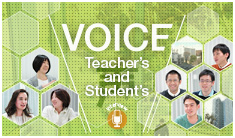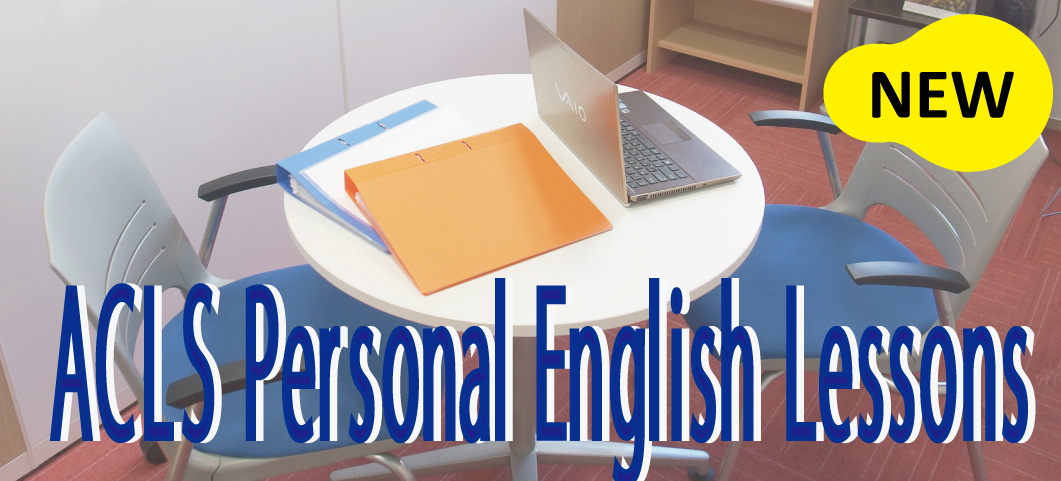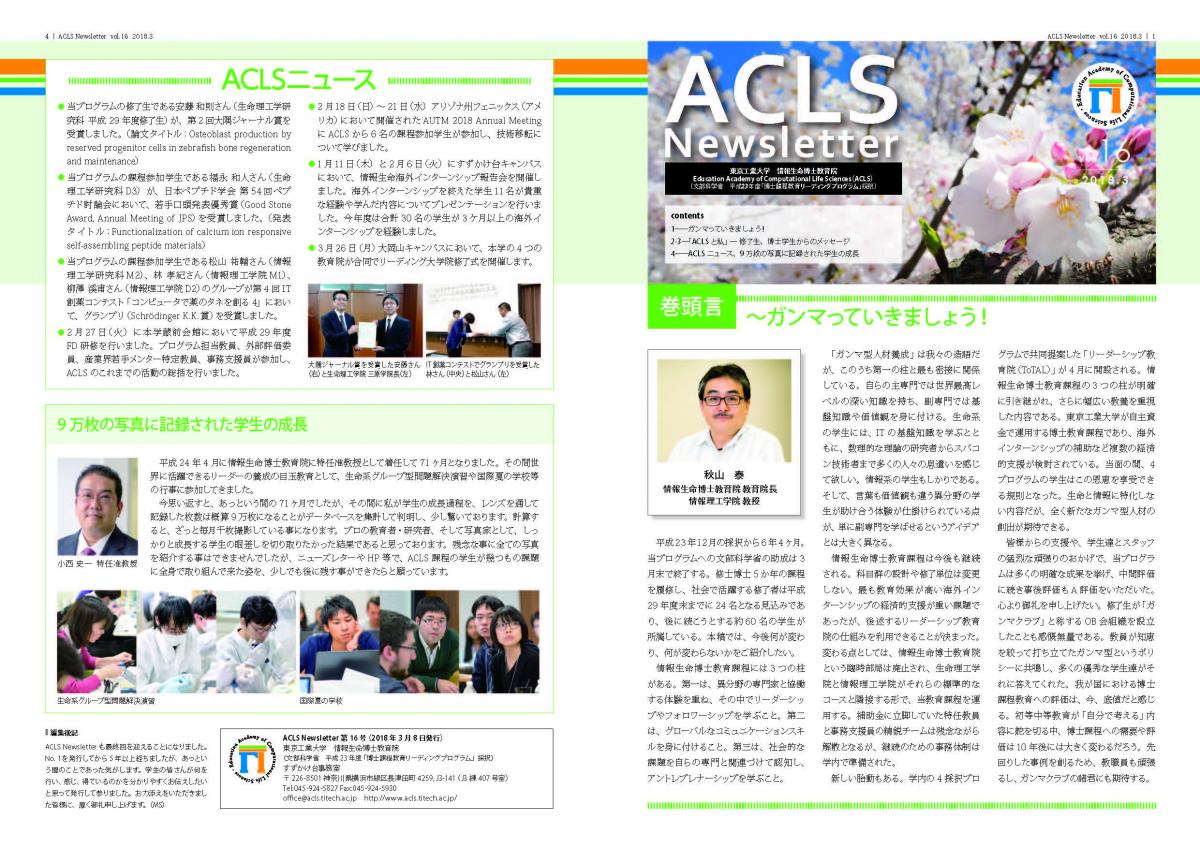- Home
- Teacher's and Student's voice
- Susumu Kajiwara
Susumu Kajiwara


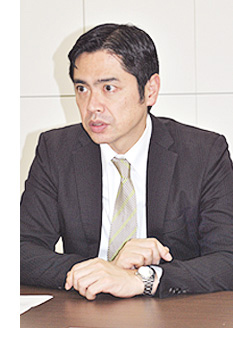 Kajiwara: For many years, I have been thinking about the education in universities and the needs of the real world. I think that what is important in advanced education nowadays is, not only to teach established academics, but to provide education that would be useful to society. The needs of society are constantly changing. As a university, the highest seat of learning, I believe that meeting the needs of the real world is just as important as safeguarding the traditional domain of academia.
Kajiwara: For many years, I have been thinking about the education in universities and the needs of the real world. I think that what is important in advanced education nowadays is, not only to teach established academics, but to provide education that would be useful to society. The needs of society are constantly changing. As a university, the highest seat of learning, I believe that meeting the needs of the real world is just as important as safeguarding the traditional domain of academia.
With this viewpoint, I have, over many years, been involved in programs serving as an intermediary between the real world and the university. What kind of education is being required by society? Before the inauguration of ACLS, I accumulated experience and observations in regard to this question by being involved in programs such as "Support for University Educational Reform" run by the Ministry of Education, Culture, Sports, Science and Technology and a project of the Japan Bioindustry Association with the Ministry of Economy, Trade and Industry. When this Leading program ACLS was being established, I thought that I must expand on these past results, and decided to participate.
At the same time, I had been of the opinion that the integration of different specialized fields of study would be crucial in the 21st Century. For example, developing robots corresponding to humans would require combining knowledge from biology and mechanical engineering. This is what is becoming required by society. The world needs people who have an understanding of multiple fields, not just one. It is my thinking that it is part of a university's responsibility to develop human resources to fill those needs, so I decided to participate in this Leading program.
For this reason, I wish for students also to be aware of this purpose when participating in this program. Students who wish to acquire a career as a mature researcher or engineer and play an active role in the real world: I wish for such students to come into the ACLS program, and have developed the program to facilitate that goal.

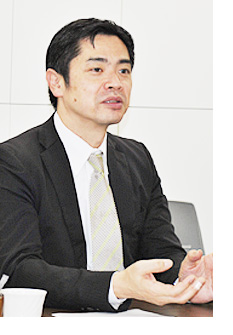 Kajiwara: As the first step, we provide many opportunities to go off-campus. Each one is an opportunity to get to know and experience the real world—what is required and how it works. Most of the students in graduate school have been dealing with only academics ever since elementary school. However, beyond graduate school, they will go out into the world. Before they do, I would like them to have an understanding of the society, to some extent.
Kajiwara: As the first step, we provide many opportunities to go off-campus. Each one is an opportunity to get to know and experience the real world—what is required and how it works. Most of the students in graduate school have been dealing with only academics ever since elementary school. However, beyond graduate school, they will go out into the world. Before they do, I would like them to have an understanding of the society, to some extent.
Specifically, a short-term internship at a company is compulsory. As they work together with company employees over one week, on problems posed by the company, they will come to understand the world a little. Of course, they will not be able to get a full grasp of business and society in such a short-term experience. Even so, it would be a trigger to think about what would be necessary in order to interact with the world. Responses to student surveys have included expressions such as "I became interested in statistics, which I had never done before" and "I decided to study more about patents". As in these cases, I believe the importance of the placement is for the student to experience a world they did not know to trigger their thinking.
It is all too easy for a graduate student to become a frog at the bottom of a well—ignorant of the real world. He is focused on his specialized field, an academic field. While that in itself is not a bad thing, he does not know the wide ocean that is the world. I believe that having those students experience society—that is what career development is.

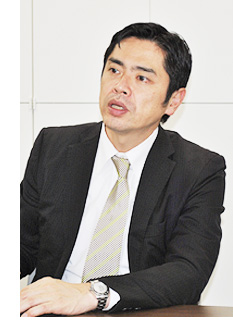 Kajiwara: In this increasingly globalized world, it is impossible for someone to have an active role in the world while limiting himself to Japan. It is another aim of ours to foster human resources that can succeed internationally. Of course, "working with the international world" is easy to say, but cannot be done without experience. It is necessary to have an understanding toward foreign countries and how to deal with people of different cultures before going out into the working world. That is why we have established the overseas training program.
Kajiwara: In this increasingly globalized world, it is impossible for someone to have an active role in the world while limiting himself to Japan. It is another aim of ours to foster human resources that can succeed internationally. Of course, "working with the international world" is easy to say, but cannot be done without experience. It is necessary to have an understanding toward foreign countries and how to deal with people of different cultures before going out into the working world. That is why we have established the overseas training program.
Overseas training is compulsory in the ACLS program. It is designed so that the student can experience various things at foreign universities and companies over a period of three months or more. What kind of experience they will have varies greatly from student to student. Some students come back so glad that they went, while others return with the conclusion that "I wasn't well-suited to being overseas". It’s not that I consider the former student a success, nor the later a failure. Each experience was valuable, and I think it will be a useful reference for determining "what is suitable for me" when they are later deciding on a career path. For this reason, we have not designed a program where everyone will come back happy. It all depends on what the student himself will do. We have only made sufficient arrangements for safety so that students do not get into accidents or become involved in incidents while they are overseas.
Of course, we provide training for students before sending them out so that they can have the skills minimally required to function. We have classes for English communication, as well as applied English, such as ones where students can acquire presentation skills. For students who, for example, are not too keen on going overseas, we can provide a temporary placement which has a schedule established to some extent. In a way, we are providing "a safe environment to 'fail' in".

 Kajiwara: The aim of this event is to gain experience in constructing a practical business plan. Each group chooses one of the existing patents provided beforehand, and goes on to plan what would be necessary to commercialize it. They start a mock business and consider variables such as the direction of development, appointment of stakeholders, and method of sales. On the final day, we invite guests who currently work in a company's R&D department or are responsible for corporate development to hear the presentations and evaluate them.
Kajiwara: The aim of this event is to gain experience in constructing a practical business plan. Each group chooses one of the existing patents provided beforehand, and goes on to plan what would be necessary to commercialize it. They start a mock business and consider variables such as the direction of development, appointment of stakeholders, and method of sales. On the final day, we invite guests who currently work in a company's R&D department or are responsible for corporate development to hear the presentations and evaluate them.
Last year, it took place in December at a training center in Kawasaki, Kanagawa Prefecture. Twenty-four students participated, and were divided into six groups of four, to compete against other groups. Half of the students were from Japan, and the other half were from overseas. Each group was made up of two Japanese and two overseas students. This time, the overseas students were from Asia, and they came from Taiwan, South Korea, Thailand, Indonesia, and Malaysia. When we divided the groups, we made an effort to make communication possible only in English. In so doing, we wanted to stimulate conversation in the common language. We assigned the groups in advance, and made communication possible over the internet a while in advance. Also, the day before, we scheduled a time for communication with other groups.
Participants develop their ideas beforehand, and bring them together in the three days and two nights as they work together with their group from morning to evening. I believe that it is very beneficial to have a realistic experience of thinking seriously and developing teamwork while still a student. We are planning to hold this event every other year. I hope many students will participate when it is held next year and again in the future.
* The contents of this article are accurate as of the date of the interview in November 2014.





